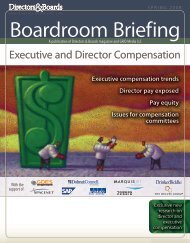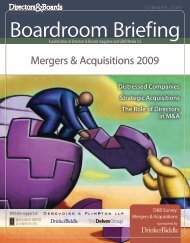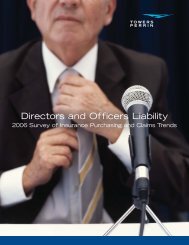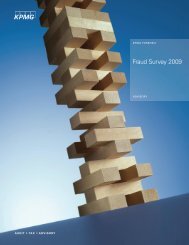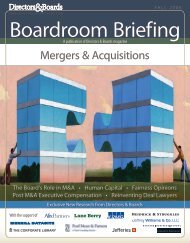The LRN ethics and compliance risk management practices report
The LRN ethics and compliance risk management practices report
The LRN ethics and compliance risk management practices report
Create successful ePaper yourself
Turn your PDF publications into a flip-book with our unique Google optimized e-Paper software.
KEY FINDINGS<br />
To address these concerns, companies need to develop comprehensive privacy <strong>and</strong> security<br />
policies; conduct audits of their data <strong>practices</strong> including Internet activities, cross-marketing<br />
<strong>and</strong> data sharing with affiliates <strong>and</strong> partners; manage their internal data usage, such as<br />
h<strong>and</strong>ling of customer <strong>and</strong> employee personal data; <strong>and</strong> educate employees to prevent<br />
breaches or losses related to data privacy.<br />
A majority of companies perform formal <strong>risk</strong> assessments involving multiple<br />
functions<br />
Respondents are taking <strong>risk</strong> assessment seriously, with nearly 9 in 10 respondents indicating<br />
they perform <strong>risk</strong> assessments regularly. Slightly more than half say they integrate <strong>ethics</strong> <strong>and</strong><br />
<strong>compliance</strong> concerns into other business assessments. Results indicate that depending on<br />
the nature of the <strong>risk</strong>, companies are utilizing one or more of the following departments in<br />
their <strong>risk</strong> assessments:<br />
• <strong>compliance</strong>,<br />
• legal,<br />
• internal audit, <strong>and</strong><br />
• human resources.<br />
Most importantly, two-thirds of respondents share the findings of the <strong>risk</strong> assessments with<br />
their Board <strong>and</strong> their senior executives, ensuring that top leadership participates in the<br />
responsibility for building ethical <strong>and</strong> law-abiding business conduct. Furthermore, almost<br />
one-quarter also share their findings with employees, thereby reinforcing ethical awareness<br />
<strong>and</strong> demonstrating the company’s commitment to fostering an ethical workplace.<br />
Only 4 in 10 respondent companies involve their business managers in the <strong>risk</strong> assessment<br />
process. <strong>The</strong> middle <strong>management</strong>s’ proximity to operations enable them not only to have<br />
a more in-depth knowledge about where the <strong>ethics</strong> <strong>and</strong> <strong>compliance</strong> challenges may lie<br />
but also to gain the subordinates trust <strong>and</strong> become the channel of choice when <strong>report</strong>ing<br />
a potential violation. Not tapping into these two key advantages of middle <strong>management</strong><br />
creates a critical gap in the <strong>risk</strong> assessment <strong>and</strong> detection processes. Furthermore, the survey<br />
results indicate that nearly all companies want supervisors to be a channel for employees to<br />
<strong>report</strong> violations, it is counterproductive to not involve them in the <strong>risk</strong> assessment process.<br />
Companies would benefit significantly by proactively including managers in every step of<br />
the <strong>risk</strong> <strong>management</strong> cycle <strong>and</strong> could substantially improve employees’ willingness to <strong>report</strong><br />
violations to managers.<br />
Companies cite engaging employees <strong>and</strong> making education more relevant as their<br />
top challenges in prevention<br />
In terms of preventing <strong>risk</strong>, respondents point to a lack of resources as their leading<br />
challenge, with nearly 6 in 10 companies marking it. However, beyond this perennial<br />
problem, the next two leading challenges reflect crucial factors that make or break getting<br />
employees motivated to take <strong>risk</strong> <strong>management</strong> personally: relevancy <strong>and</strong> engagement.<br />
More than 4 in 10 respondents indicate making the education relevant is their next most<br />
significant challenge, <strong>and</strong> one-quarter cited engaging employees.<br />
<strong>The</strong> search for relevancy <strong>and</strong> engagement is critical in <strong>risk</strong> prevention. <strong>The</strong> learning theory<br />
states that adults pay less attention to information that does not directly affect their<br />
jobs than they do to information that has an immediate value to their day-to-day work.<br />
Numerous studies have also shown that engaging people in their learning boosts their<br />
interest in <strong>and</strong> ability to use the knowledge. Learning resources that allow people to control<br />
their own progress, interact with the materials, <strong>and</strong> gauge their learning through self-tests<br />
have proven to have higher impact on adults than one-dimensional lessons that workers<br />
passively read or listen to.<br />
<strong>LRN</strong> | 2008 Ethics <strong>and</strong> Compliance Risk Management Practices Report | 7


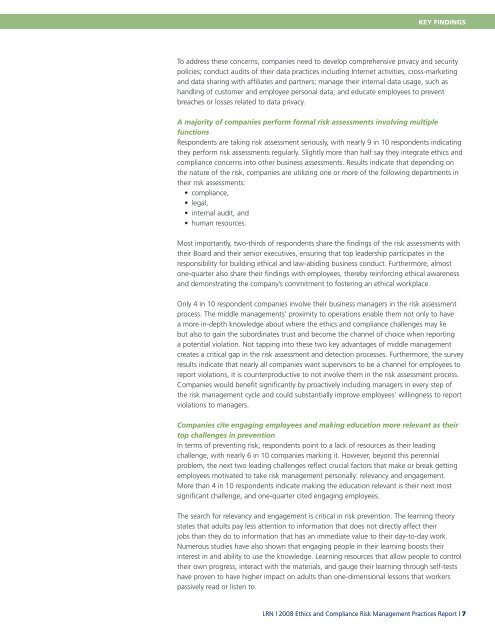


![[link to PDF] for a copy of the briefing paper - Directors & Boards](https://img.yumpu.com/43729022/1/190x245/link-to-pdf-for-a-copy-of-the-briefing-paper-directors-boards.jpg?quality=85)

